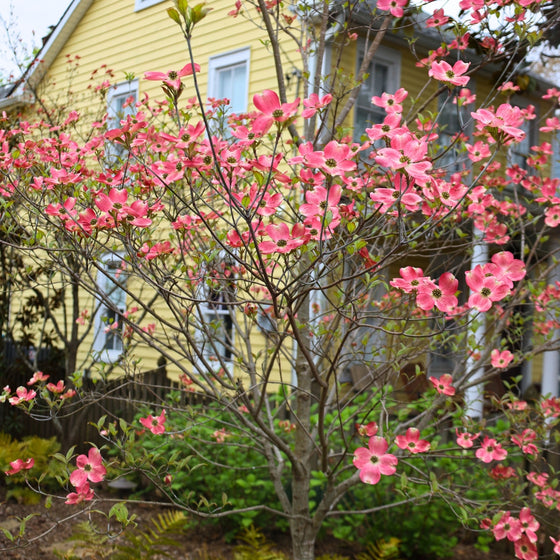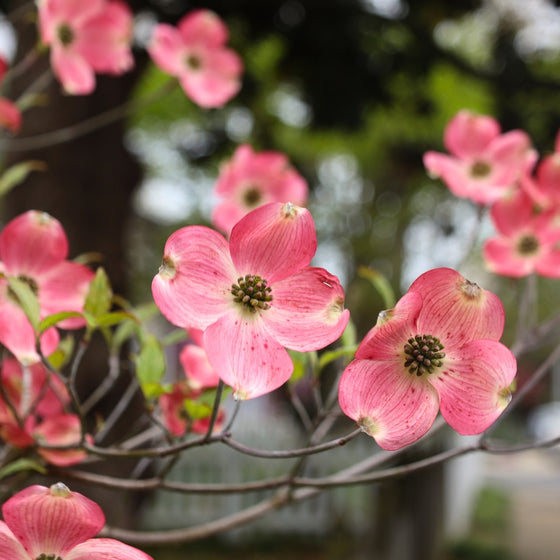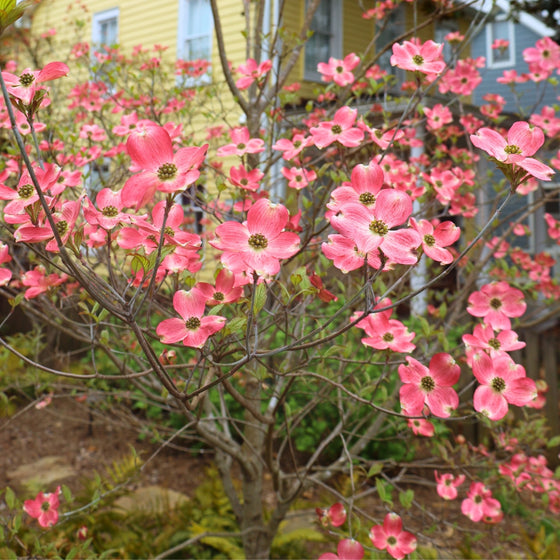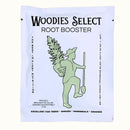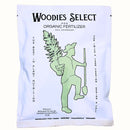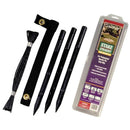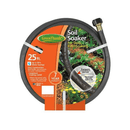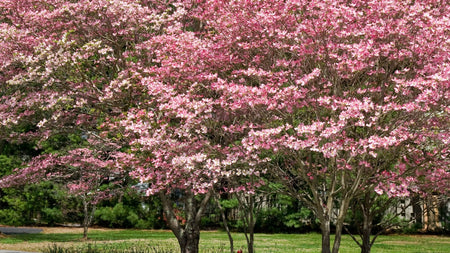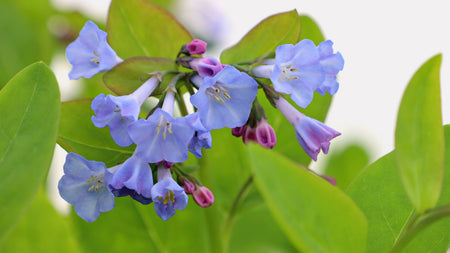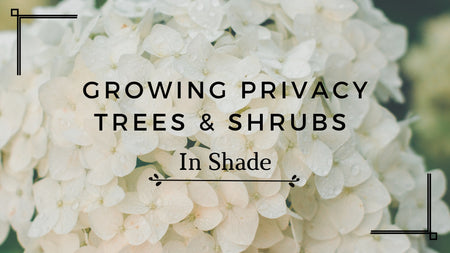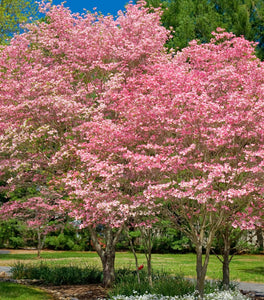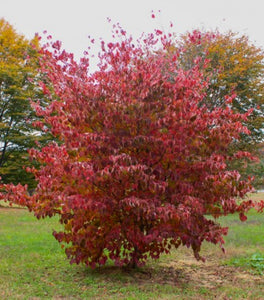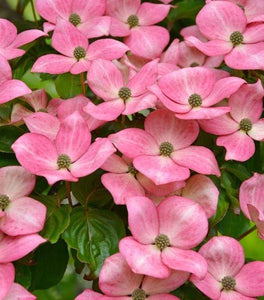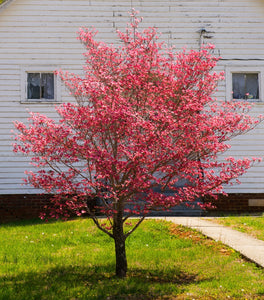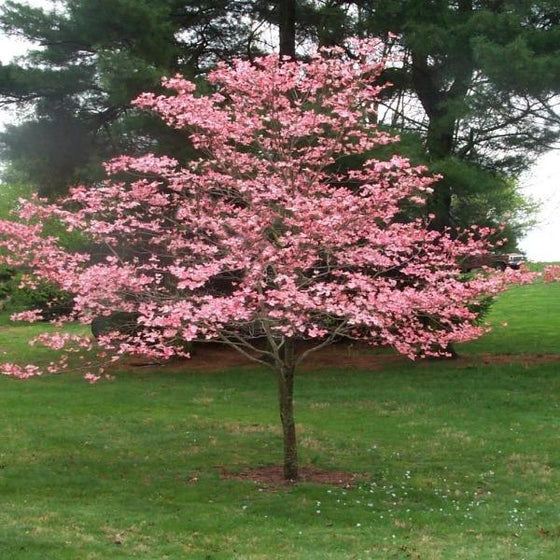
Images Depict Mature Plants
Pink Flowering Dogwood Trees for Sale Online
Our native Pink Dogwood Tree is a stunning medium-sized tree perfect for smaller yards and secluded landscape projects. In early spring, you’ll watch this popular landscape tree blanket itself in pink blooms the size and shape of butterflies perched on the branch tips.
Summer brings lush dark green leaves on these popular ornamental trees, that provide perfect levels of filtered shade. In fall the show's not over; the Flowering Dogwood's green foliage turns a beautiful bright red in autumn. Songbirds will return again and again to the Pink Flowering American Dogwood to gather the glossy red fruits in autumn and winter.
Botanically referenced as 'Cornus Florida,' these Pink Dogwood Trees are native to eastern regions of the United States. The flowering natives enjoy conditions of full sun to partial shade and slightly acidic soil. When it comes to watering your Dogwood Tree, we would recommend watering deeply, but not too often. As a means of protecting your tree's root systems, we would also recommend applying a layer of mulch around the base of the tree.
Attracting a wide range of wildlife to your yard, boasting stunning pink blooms, and multi-seasonal interest, it's easy to understand why so many people love the Pink Flowering Dogwood Tree. Plant this flowering tree as a yard focal point, or even use in mass along sidewalks and yard borders for a real show of color!
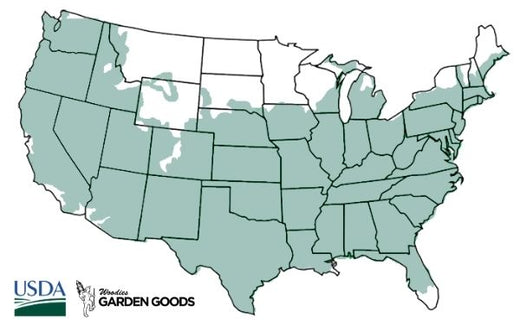
| Hardiness Zone: | 5-9 |
|---|---|
| Mature Height: | 20 to 25 Feet |
| Mature Width: | 20 to 25 Feet |
| Classification: | Broad leaved deciduous tree, flowering tree |
| Sunlight: | Full sun to part shade |
| Habit: | Medium branching |
| Foliage: | Green; deep red fall color |
| Flower Color: | Deep pink |
| Pruning Season: | No pruning needed |
| Soil Condition: | Any well drained soil |
| Water Requirements: | Water well until established |
| Uses: | Tolerates all soil types and full sun |
How to Care for Pink Dogwood
Be sure to read our planting instructions to ensure a healthy and happy plant for years to come!
How do I fertilize Pink Flowering Dogwoods?
Bio-tone starter fertilizer is a great starter fertilizer that provides plants with mycorrhizae fungus. It is a naturally occurring beneficial fungus that colonizes on the new growing roots of plants. It creates a barrier between the roots of the plant and fungus and pathogens that can cause root rot. Fertilize Dogwood Cornus Florida again 6 to 8 weeks later to encourage denser foliage or faster growth of young trees. Native Dogwoods do prefer a slightly acidic growing environment so the use of an acidic fertilizer such as Holly-Tone by Espoma is recommended in areas of the country where the soil tends to have a less than acidic soil profile.
How do I mulch a Pink Dogwood Tree?
We highly recommend that you mulch your Pink Dogwood Tree with either a ground hardwood mulch or a ground cypress mulch depending on your local availability. Any type of mulch will do but cypress or hardwood mulch will be of a higher quality and provide better nutrition overall as they breakdown. Mulching helps to keep weeds away which will compete with your new investment for water and nutrients. A 2 to 3 inch layer of mulch is sufficient but remember to take care not to cover any part of the stem of the plant with mulch. It's better to leave a one inch gap of space between the mulch and the stem or trunk of the plant.
How do I water Pink Dogwood Tree?
After planting the Pink Dogwood Tree, give it a slow, deep watering. Most of the water you put on the plant at first will run away from the plant until the soil is soaked. A general rule of thumb is to count to 5 for every one gallon of pot size. For example a one gallon pot would be watered until you count to 5 a three gallon pot would be 15 and so on. Check the plant daily for the first week or so and then every other day there after. Water using the counting method for the first few weeks. Gator Bags can be used to help aid in this process and also provide plants with a good soaking due to the slow release of the water into the root-zone of the plant. Soaker Hoses can also be used to water when planting a long row of trees.
How do I plant a Pink Flowering Dogwood?
We suggest when planting your newly purchased Pink Dogwood Tree plants that you dig a hole twice as wide as the root system but not deeper. Depending on the quality of your existing soil you may need to add a locally sourced compost or topsoil to the back-fill soil. We do not recommend using straight topsoil or compost as a back-fill soil because more times than not these products will retain entirely to much moisture and will cause the root system to rot. Adding compost or topsoil will help the young feeder roots of Cornus Florida to spread through the loose, nutrient rich soil, much easier than if you used solely the existing soil which more times than not will be hard and compacted. The most common cause of plant death after transplanting is planting the new plant too deep. That is why we do not recommend planting in a hole any deeper than the soil line of the plant in the pot. A good rule is that you should still be able to see the soil the plant was grown in after back-filling the hole.

